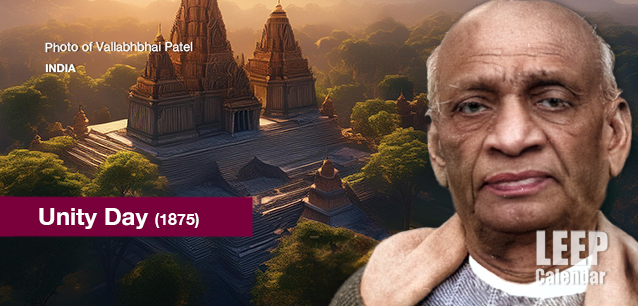 AD
AD
Today is: January 09
Scroll to explore events active on this date.
Additional Events on LEEP
LEEP INK FEATURES

August? Absolutely!
In August, we live through the Dog Days of Summer. It's hot and often humid, and those who can leave for better climates do. Down south, winter is in full force. August is also known as "the ...

In The Heat of July: July 2025 Events
Is it hot enough (or cold enough if you're below the equator) for you yet? There is actually a day for that! Like every month, I pick a diverse collection of events you may or may not know about. This ...

May Blooms: Events in May 2025
Along with October, May is one of the most densely packed months of the year. It's before the summer humidity and the last whole month of the school year. The weather is warming in t...
About Unity Day in India
Civil Rights , India
Ends: Oct 31, 2025
DESCRIPTION:
CELEBRATING VALLABHBHAI PATEL:
UNITY DAY IN INDIA
Unity Day, also known as Rashtriya Ekta Diwas, is observed annually on October 31st in India to honor the legacy of Sardar Vallabhbhai Patel, one of the country's most respected leaders and a key figure in India's struggle for independence. The day marks Patel's birth anniversary in 1875 and celebrates the spirit of unity and integrity he embodied throughout his life.
The Government of India established Unity Day in 2014 to commemorate Sardar Patel's crucial role in unifying India after its independence from British rule. Often referred to as the "Iron Man of India," Patel was instrumental in integrating the princely states into the newly independent nation, ensuring that India emerged as a united and stable country. His efforts laid the foundation for the modern Indian state. Unity Day serves as a reminder of the importance of national cohesion and the enduring values of unity and integrity.
Unity Day includes various events and activities to promote national unity and foster a sense of collective identity among the citizens. The day typically begins with a ceremonial Run for Unity, organized in cities and towns across the country, where people from all walks of life participate in a public run to symbolize the nation's unity.
In addition to the Run for Unity, the day features commemorative events such as public speeches, cultural programs, and exhibitions highlighting Sardar Patel's contributions to the nation. Schools and educational institutions often organize special assemblies, debates, and essay competitions to engage students in discussions about the significance of national unity and the lessons emblematic of Patel's life and work.
Government buildings and public spaces boast banners and posters celebrating Unity Day, and special ceremonies occur at prominent locations, including the Statue of Unity in Gujarat, the world's tallest statue and a tribute to Sardar Patel.
UNITY DAY AND NATIONAL IDENTITY
Unity Day is essential for reflecting on the values underpinning India's national identity. It reinforces the idea that despite the country's vast diversity of languages, cultures, and religions, the Indian people are committed to democracy, secularism, and the rule of law. The day encourages all citizens to work together to strengthen the bonds of unity and to continue building a nation that reflects the ideals of its founders.
In essence, Unity Day is not just a celebration of Sardar Patel's legacy but also a reaffirmation of the principles of unity and integrity that are vital for India's progress and prosperity.
VIDEOS
SUPPORTING DOCUMENTS
Currently, this event does not have supporting documents.
ADDITIONAL IMAGES
Currently, this event does not have supporting images.
Where would you like to go now?
 AD
AD


/footer-logo.svg)
